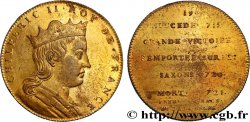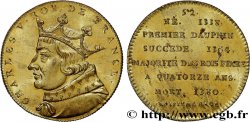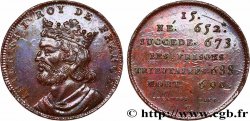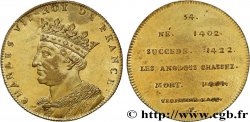fjt_743392 - SÉRIE MÉTALLIQUE DES ROIS DE FRANCE Règne de CHARLEMAGNE - 23 - frappe Louis XVIII, lourde n.d.
40.00 €
Количество
Добавить в корзину

Тип Règne de CHARLEMAGNE - 23 - frappe Louis XVIII, lourde
Дата: n.d.
Металл: red copper
Диаметр: 33 mm
Ориентация осей монеты: 12 h.
Вес: 12,72 g.
Век: cannelée
Редкость: R1
Комментарии о состоянии
Jeton nettoyé
Происхождение:
Exemplaire provenant de la Collection MARINECHE
Лицевая сторона
Аверс: легенда: CHARLEMAGNE ROY DE FRANCE.
Аверс: описание: Buste imaginaire lauré, cuirassé et drapé à gauche.
Обратная сторона
Реверс: легенда: 23 - NÉ 742 - SACRÉ 768 - COURONNÉ EMPEREUR D’OCCIDENT 800 - MORT 814 - SECONDE RACE . P.
Реверс: Описание: en huit lignes.
Комментарий
Charles Ier, dit le Grand ou Charlemagne (en latin Carolus Magnus, en allemand Karl der Große), est né le 2 avril, probablement en 742 ou 748, sans certitude quant au lieu de naissance. Il est mort à Aix-la-Chapelle le 28 janvier 814. Il est roi des Francs (768-814), devient par conquête roi des Lombards (774-814) et est couronné empereur par le pape Léon III le 25 décembre 800, relevant une dignité prestigieuse disparue depuis l'an 476 en Occident.
Monarque guerrier, il agrandit notablement son royaume par une série de campagnes successives, en particulier par la lente mais néanmoins violente soumission des Saxons païens (772-804). Souverain réformateur, soucieux d'orthodoxie religieuse et de culture, il protège les arts et les lettres et est à l'origine de la « renaissance carolingienne ».
Son œuvre politique immédiate ne lui survit pas longtemps. Respectueux de la tradition germanique en matière successorale, Charlemagne avait prévu le partage de l'Empire entre ses trois fils dès 806. L'empire ne sera finalement partagé entre ses trois petits-fils qu'au traité de Verdun en 843. Le morcellement féodal des siècles suivants, puis la division de l'Europe en États-Nations rivaux condamnent à l'impuissance ceux qui tentent explicitement de restaurer l'empire universel de Charlemagne, en particulier les souverains du Saint-Empire romain germanique, d'Otton Ier en 962 à Charles Quint au XVIe siècle, ou encore Napoléon Ier, hanté par l'exemple du plus éminent des Carolingiens.
Pour la suite de sa biographie, voir http://fr.wikipedia.org/wiki/Charlemagne.
Charles I, known as the Great or Charlemagne (in Latin Carolus Magnus, in German Karl der Große), was born on April 2, probably in 742 or 748, without certainty as to the place of birth. He died in Aix-la-Chapelle on January 28, 814. He was king of the Franks (768-814), became king of the Lombards by conquest (774-814) and was crowned emperor by Pope Leo III on December 25, 800, reviving a prestigious dignity that had disappeared in the West since the year 476..
A warrior monarch, he significantly expanded his kingdom through a series of successive campaigns, in particular through the slow but nevertheless violent submission of the pagan Saxons (772-804). A reforming sovereign, concerned with religious orthodoxy and culture, he protected the arts and literature and was at the origin of the \\\"Carolingian renaissance\\\".
His immediate political work did not long outlive him.. Respectful of the Germanic tradition in matters of succession, Charlemagne had planned the division of the Empire between his three sons from 806. The empire was finally divided between his three grandsons only at the Treaty of Verdun in 843.. The feudal fragmentation of the following centuries, then the division of Europe into rival nation-states, condemned to impotence those who explicitly attempted to restore the universal empire of Charlemagne, in particular the sovereigns of the Holy Roman Empire, from Otto I in 962 to Charles V in the 16th century, or even Napoleon I, haunted by the example of the most eminent of the Carolingians..
For the rest of his biography, see http://fr. Wikipedia. org/wiki/Charlemagne
Monarque guerrier, il agrandit notablement son royaume par une série de campagnes successives, en particulier par la lente mais néanmoins violente soumission des Saxons païens (772-804). Souverain réformateur, soucieux d'orthodoxie religieuse et de culture, il protège les arts et les lettres et est à l'origine de la « renaissance carolingienne ».
Son œuvre politique immédiate ne lui survit pas longtemps. Respectueux de la tradition germanique en matière successorale, Charlemagne avait prévu le partage de l'Empire entre ses trois fils dès 806. L'empire ne sera finalement partagé entre ses trois petits-fils qu'au traité de Verdun en 843. Le morcellement féodal des siècles suivants, puis la division de l'Europe en États-Nations rivaux condamnent à l'impuissance ceux qui tentent explicitement de restaurer l'empire universel de Charlemagne, en particulier les souverains du Saint-Empire romain germanique, d'Otton Ier en 962 à Charles Quint au XVIe siècle, ou encore Napoléon Ier, hanté par l'exemple du plus éminent des Carolingiens.
Pour la suite de sa biographie, voir http://fr.wikipedia.org/wiki/Charlemagne.
Charles I, known as the Great or Charlemagne (in Latin Carolus Magnus, in German Karl der Große), was born on April 2, probably in 742 or 748, without certainty as to the place of birth. He died in Aix-la-Chapelle on January 28, 814. He was king of the Franks (768-814), became king of the Lombards by conquest (774-814) and was crowned emperor by Pope Leo III on December 25, 800, reviving a prestigious dignity that had disappeared in the West since the year 476..
A warrior monarch, he significantly expanded his kingdom through a series of successive campaigns, in particular through the slow but nevertheless violent submission of the pagan Saxons (772-804). A reforming sovereign, concerned with religious orthodoxy and culture, he protected the arts and literature and was at the origin of the \\\"Carolingian renaissance\\\".
His immediate political work did not long outlive him.. Respectful of the Germanic tradition in matters of succession, Charlemagne had planned the division of the Empire between his three sons from 806. The empire was finally divided between his three grandsons only at the Treaty of Verdun in 843.. The feudal fragmentation of the following centuries, then the division of Europe into rival nation-states, condemned to impotence those who explicitly attempted to restore the universal empire of Charlemagne, in particular the sovereigns of the Holy Roman Empire, from Otto I in 962 to Charles V in the 16th century, or even Napoleon I, haunted by the example of the most eminent of the Carolingians..
For the rest of his biography, see http://fr. Wikipedia. org/wiki/Charlemagne







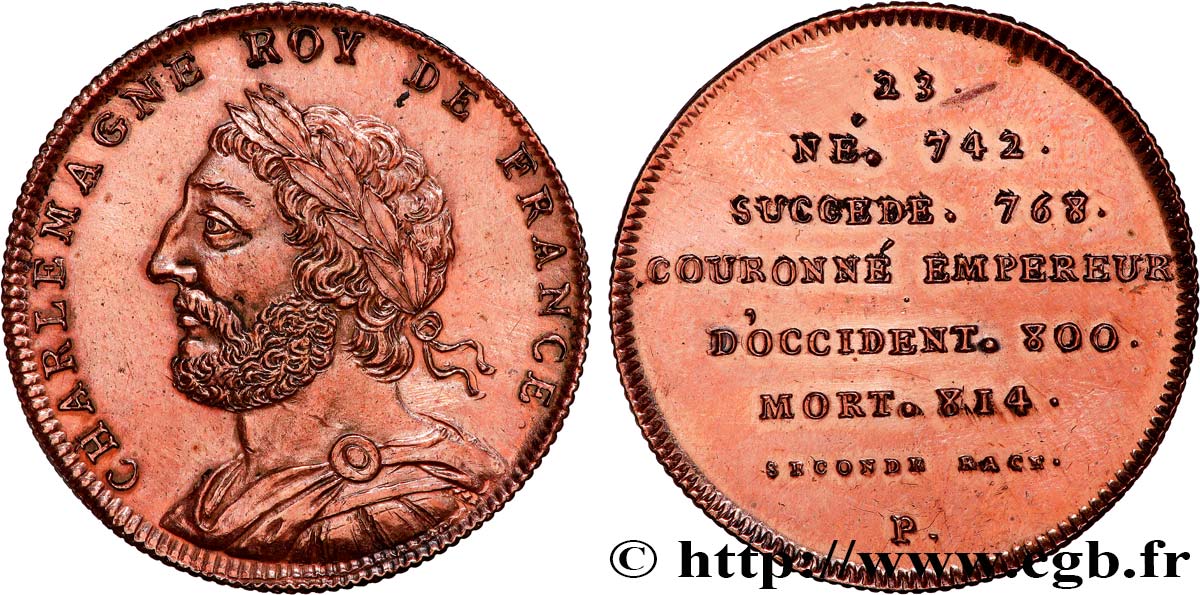
 Cообщить об ошибке
Cообщить об ошибке Распечатать страницу
Распечатать страницу Отправить мой выбор
Отправить мой выбор Задать вопрос
Задать вопрос Consign / sell
Consign / sell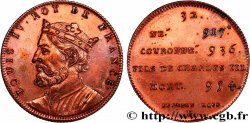
 Информация
Информация